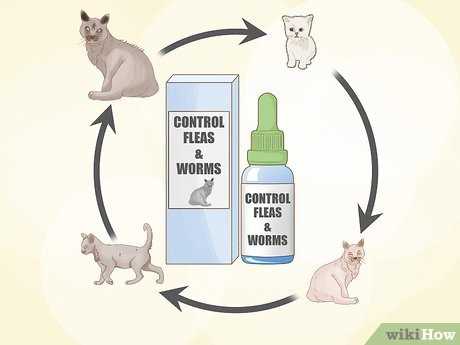

First off, a vet-approved dewormer is the best choice. Medications like praziquantel, fenbendazole, and pyrantel pamoate are commonly used and effective against various types of intestinal parasites. These can be found in both prescription and over-the-counter forms, but it’s essential to consult a veterinarian for the right dosage based on age and weight.
Incorporating a balanced diet with high-quality food can support your pet’s overall health and immune system, making it less susceptible to infestations. Some veterinary diets are specifically formulated to help manage intestinal health. Always check the ingredients and consult your vet to ensure the food meets your furry friend’s needs.
For those looking for natural remedies, pumpkin seeds have shown promise. They contain compounds that may help eliminate certain types of worms. Grinding and mixing them into your companion’s food could serve as an additional measure, but it shouldn’t replace medical treatment.
Maintaining a clean environment is crucial. Regularly cleaning the litter box and keeping your living space tidy can prevent reinfestation. It’s a simple step that can make a significant difference in keeping your home worm-free.
Identifying Types of Worms in Cats
Recognizing the specific type of intestinal parasites is crucial for effective treatment. The most common varieties include:
Roundworms
Roundworms are long, spaghetti-like creatures that can grow up to several inches in length. Symptoms may include weight loss, vomiting, and a distended abdomen. If you notice these signs, a vet visit is essential for diagnosis and treatment.
Tapeworms
Tapeworms resemble flat, ribbon-like segments. Often, you may see small rice-like pieces around your furry friend’s rear. Itching and discomfort are common indicators, and a vet can provide appropriate medication.
Less frequently seen but equally concerning are hookworms and whipworms, which can also affect health. Regular check-ups help in early identification. For more fun, consider unique names like those in this cat names for grey cats list!
Always consult a veterinarian for correct identification and treatment options tailored to your feline’s needs.
Symptoms Indicating Worm Infestation
Pay attention to appetite changes. A sudden increase or decrease often signals issues. Weight loss despite regular feeding can also indicate a problem. When I noticed my weight dropping, it raised alarms.
Look out for changes in stool. Diarrhea or the presence of worms in feces are clear signs. Straining during elimination is another indicator. If my human sees anything unusual, immediate action is necessary.
Behavioral Signs

Unusual behavior such as lethargy or restlessness should not be ignored. If I’m hiding more or avoiding playtime, it might mean something’s off. Excessive grooming or biting at the rear can point to irritation caused by parasites.
Physical Symptoms
Check for a bloated belly or visible worms around the anus. This can often point to a severe infestation. Skin irritations or fur loss might also occur, as parasites can affect overall health. If my coat looks dull or unkempt, it might be worth investigating.
Monitoring these signs helps ensure a healthy and happy life. If any symptoms appear, consulting a vet is always wise.
Over-the-Counter Medications for Cats
For tackling intestinal parasites, several over-the-counter products can be used. Pyrantel pamoate is one option effective against roundworms and hookworms. It’s available in liquid and tablet forms, making it easy to administer. Follow the dosage instructions carefully, typically based on weight.
Fenbendazole is another medication that treats a variety of worms, including tapeworms and whipworms. It usually comes in granules or tablets. Consistency in administering it over a few days is key to ensuring all parasites are eliminated.
Praziquantel specifically targets tapeworms and can often be found in both single-dose tablets and injectable forms. Make sure to consult the instructions to confirm the correct dosage.
When selecting a product, consider checking the label for safety information and any specific warnings related to age or health conditions. If unsure, consulting a veterinarian is always a wise choice to confirm the suitability of a product.
Prescription Treatments from Veterinarians
My human often consults a veterinarian for specialized medications to tackle those annoying parasites. Some of the commonly prescribed options include Pyrantel pamoate, which operates by paralyzing worms, allowing them to be expelled naturally. Another popular choice is Fenbendazole, effective against various types of intestinal invaders.
For more severe infestations, Milbemycin oxime is an excellent recommendation, targeting heartworms and some intestinal types. Praziquantel is another prescription favorite, particularly useful for dealing with tapeworms. These medications are often given in a single dose, but the veterinarian may suggest a follow-up treatment depending on the situation.
It’s crucial to follow the veterinarian’s instructions regarding dosages and treatment duration. Regular check-ups are also important to monitor the effectiveness of the prescribed therapy. This ensures that any lingering issues are addressed promptly. Trusting a professional with the right knowledge makes a significant difference in maintaining a healthy, worm-free life.
Natural Remedies for Worms in Cats
Garlic is a popular choice among pet parents seeking natural options. Small amounts of garlic can help expel parasites. However, consult with a vet to determine the right dosage for safety.
Herbal Infusions

- Wormwood: Known for its antiparasitic properties, wormwood can be brewed as a tea. A few drops added to food may aid in worm elimination.
- Neem: This herb is recognized for its ability to disrupt parasite life cycles. A diluted neem oil can be applied externally, while neem leaf powder can be mixed into meals.
- Pumpkin Seeds: These seeds contain cucurbitacin, which paralyzes worms, making it easier for the body to expel them. A small amount of crushed seeds added to food can be beneficial.
Dietary Adjustments
Incorporating probiotics into the diet can strengthen the immune system, making it harder for worms to thrive. Plain yogurt or specific probiotic supplements designed for pets can be included in meals.
Always ensure fresh water is available to help flush out any toxins. Regularly cleaning the litter box and maintaining hygiene in the living area reduces the risk of reinfestation.
For more tips on maintaining a healthy environment, check out this best petrol pressure washer to unblock drains.
Preventative Measures Against Worms
Regular deworming is a must. I recommend a vet-approved schedule based on age and lifestyle. Indoor dwellers might require less frequent treatments than adventurous outdoor explorers.
Maintaining a clean litter box is crucial. Keeping my bathroom tidy reduces the chance of reinfestation. Daily scooping is my human’s responsibility!
Proper hygiene after playtime is vital. Washing hands after handling toys or interacting with potential carriers, like other animals, helps minimize risks.
Nutrition plays a role too. High-quality food strengthens my immune system, making it easier to fend off unwanted guests. Look for brands with natural ingredients and no fillers.
Avoiding contact with stray animals is wise. Outdoor excursions should be limited to supervised play, reducing exposure to potential parasites.
Regular vet check-ups help catch issues early. My humans ensure I see the vet at least once a year for a wellness exam, which includes parasite screenings.
| Preventative Measure | Frequency | Notes |
|---|---|---|
| Deworming | Every 3-6 months | Consult with a vet for specific needs |
| Litter Box Cleaning | Daily | Minimize risk of reinfestation |
| Hygiene Practices | After every play session | Wash hands thoroughly |
| Nutrition | Daily | Choose high-quality food |
| Vet Check-ups | Annually | Includes parasite screenings |
When to Seek Veterinary Help for Worms
Immediate assistance from a veterinarian is necessary if any of the following signs appear:
- Severe weight loss despite a normal appetite.
- Persistent vomiting or diarrhea that doesn’t resolve within a day.
- Blood in feces or unusual fecal consistency.
- Visible worms in feces or around the anal area.
- Excessive grooming or scratching around the rear end.
- Signs of lethargy or withdrawal from usual activities.
- Unexplained abdominal swelling.
Proactive Veterinary Visits
Regular check-ups should be part of a healthy routine. Annual fecal examinations help detect infestations early. Discuss any potential exposure to contaminated environments or other animals with the vet. This information can guide choices on preventive treatments.
What to Prepare for the Vet Visit
Before heading to the clinic, gather important details:
- Current diet and any recent changes.
- Behavioral shifts or unusual habits.
- Any recent travel or exposure to other pets.
Providing accurate information aids the veterinarian in diagnosing and determining the best treatment strategy.
FAQ:
What are some common symptoms of worms in cats?
Cats with worms may exhibit a range of symptoms. Common signs include weight loss despite a good appetite, vomiting, diarrhea, and lethargy. You might also notice worms in their feces or around their anus. Additionally, some cats may have a bloated abdomen or increased grooming in the affected area. If you observe any of these symptoms, it is advisable to consult a veterinarian for proper diagnosis and treatment.
What types of medication can I give my cat for worms?
There are several types of medications available for treating worms in cats. Common options include praziquantel for tapeworms, fenbendazole for roundworms, and milbemycin oxime for various types of worms. These medications can come in the form of tablets, liquids, or topical treatments. It’s essential to consult a veterinarian to determine the appropriate medication and dosage based on your cat’s specific needs and health status.
Can I use over-the-counter remedies for my cat’s worms?
While some over-the-counter products claim to treat worms in cats, it is best to avoid them without veterinary advice. Not all products are safe or effective, and using the wrong one can harm your cat. A veterinarian can provide a proper diagnosis and recommend safe, effective treatments tailored to your cat’s health. Always prioritize professional guidance when dealing with parasitic infections.
How can I prevent my cat from getting worms?
Preventing worms in cats involves several strategies. Regular veterinary check-ups can help catch any infestations early. Keeping your cat indoors reduces exposure to parasites. Additionally, practicing good hygiene, such as cleaning the litter box frequently and ensuring your cat is on a preventive medication as advised by your vet, can significantly lower the risk of infection. You should also be cautious about feeding your cat raw meat, as it can harbor parasites.
How often should I deworm my cat?
The frequency of deworming your cat depends on various factors, including their age, lifestyle, and health status. Kittens are often dewormed every two to three weeks until they are about three months old. For adult cats, deworming is typically recommended at least once a year, especially if they go outdoors or are exposed to other animals. Your veterinarian can provide personalized recommendations based on your cat’s specific situation.








